When I was preparing for this interview, I looked back at my DC theatergoing and found nearly two dozen shows I’ve seen that Matthew Gardiner directed, going back to the world premiere of Really Really in 2012, which I loved. It was among his first shows at Signature Theatre after being hired in 2010 as associate artistic director. Connecting the dots of his productions since, I found myself appreciating and admiring the extraordinary scope of theatrical brilliance he’s put on stage. For his talent as a director of musicals, he has received three Helen Hayes Awards and more than a dozen nominations.
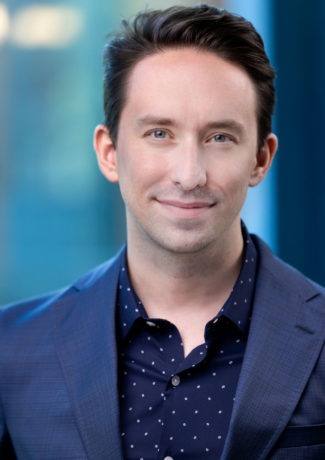
He now has a new role, as artistic director of Signature Theatre, where in July he was named to the position to succeed Eric Schaeffer, who resigned in June 2020 following accusations of sexual assault.
I’m always interested in how artistic directors think. I’ve talked to a number of them when they just came into an artistic director job here in town — Ari Roth, Adam Immerwahr, Maria Manuela Goyanes, Simon Godwin. (And my colleague Ramona Harper recently talked with Karen Ann Daniels.) I’m always curious why they choose what they choose, how they lead, what they hope to make happen, who they are. There is a lot that goes into theater-making, but always, for me, the vision and values of a theater’s artistic director are key — so it has been on my mind to talk with Matthew.
With the reopening of live theater and his production of the musical Rent coming up, this felt like a good time. Even as he is right now in rehearsal for the iconic rock musical that will kick off Signature’s new season, he is also in a sense in rehearsal to play his new role as Signature’s AD.
In a cordial phone call, I asked him about three topics: Rent, which opens under his direction at Signature November 2; the musical theater genre generally, which very much matters to him and which he excels at; and his new artistic director role and responsibility at Signature, as distinct from the role he was in before, in the aftermath of his predecessor and mentor’s resignation.
This interview has been edited for length and clarity.
John: When Rent opened 25 years ago, it was very much of the moment, like an anthem of a generation. How do you see the show through the lens of today — what’s happening in the world now around race, gender, class, contagion — and how will your production show us what you see?
Matthew: Signature is known for reimagining great pieces of musical theater, and Rent has been a musical we have discussed many times over the years as a piece that we should reimagine. But I never connected to it in the moment that we were discussing it. I was always like, Well, I love it for its nostalgic value in my life, but what is the value to share that story in this moment?
As we entered this past year and a half of disconnection and isolation and lacking community, the show hit me in a completely different way. Some people would see it as “Matthew has picked Rent because we have just gone through this pandemic” — like I’m trying to correlate the AIDS/HIV epidemic in some way. But really the thing that landed to me was the idea of the need for community and the need for found family and the need to break free from isolation. I thought that was important in this moment, as we reemerge and come together to hear stories and be together again. And that’s why we landed on Rent to reopen Signature.
To speak to the present moment, sometimes it is easiest to do so by holding up a magnifying glass to the past. So while to some, a musical written in the nineties may feel outdated, to me there are things about Rent that resonate even more now.
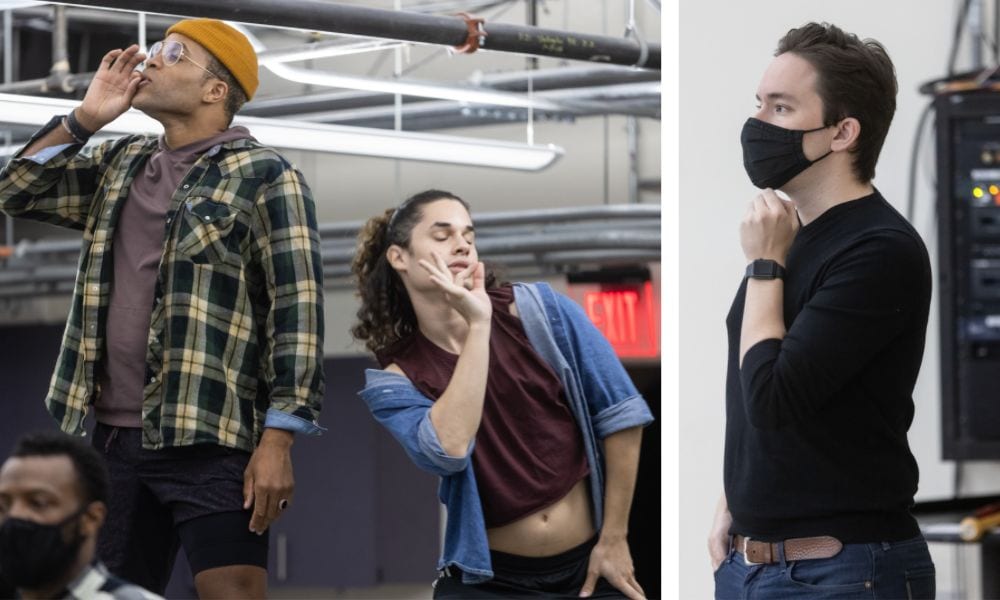
You have cast members who weren’t born when Rent began.
Yeah. At the first rehearsal I was talking about what Rent meant to me. I was in middle school when the musical premiered on Broadway. And I started to recognize that what I was saying about my experience with the piece was not the same for many of the twentysomethings in the room.
What’s the rehearsal room been like for this show? Is there something about it that’s different?
Oh, incredibly emotional, magical. The difference in the room is that it all feels more special. It doesn’t feel like anybody is taking this for granted or like this is another job. We are creating something for a live audience after a year and a half of not being able to do so.
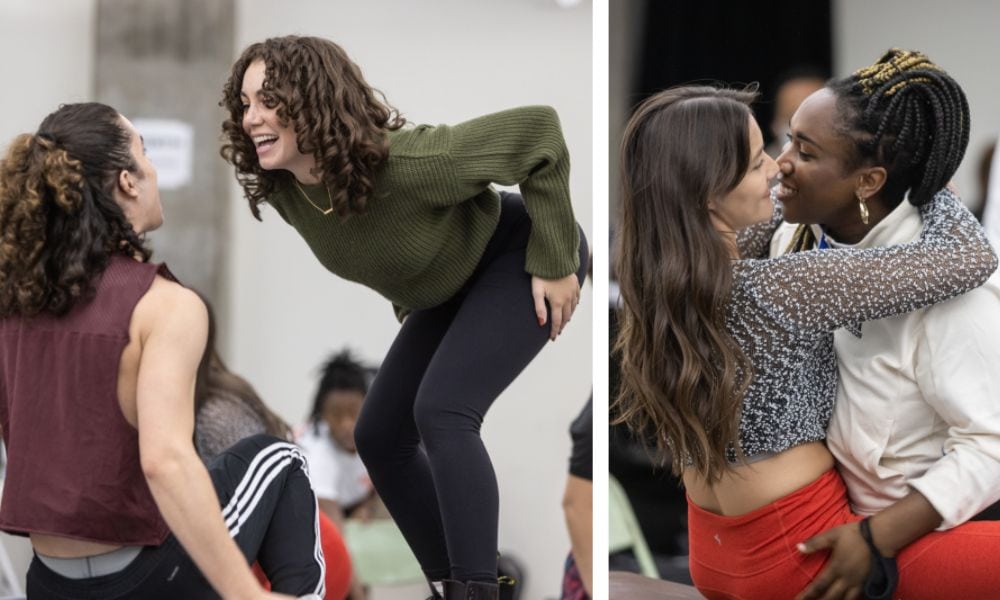
For folks who have seen Rent before, on stage or on film, and who might not get the point of seeing it again, what moments in your production might we look for where you as director have done something different and specific to touch us or speak to us here and now?
Honestly, the big thing is that the piece resonates more for me now. It resonates for the artists in a way now that it wouldn’t have a year and a half ago. I’ve never been a director that hammers away at an idea to try to prove the relevance of a piece of work in the here and now. We can still set it in the nineties and it can still be evocative of that time period and still ring true to the moment we’re living in. And the way it’s going to ring true is the importance of it to the artists that are telling the story, whether it is the designers or the actors or myself. We are going to view it through a lens that is ours in the present moment.
We are not remounting Michael Greif’s very important original production. We are very much looking at it and going, Let’s break it apart. Let’s ask questions about it. Let’s look at this from a new angle. What does it mean if this moment happens in a completely different way? I don’t want to share anything too specific about moments we’re doing differently, but I will say I’m not setting Rent in 2021. It’s set in the late eighties early nineties, and it is very specific to that moment in time.
I’d like to talk next about musical theater more generally. You’ve said that Signature’s commitment to musical theater is what first drew you to the place. What is it about the musical theater form that you personally most love and cherish?
Oh, it’s the way that music cuts directly to your heart. It cuts directly to the emotion behind the moment. Regardless of whether it’s musical theater or just music used in theater, the way that music can impact an audience, the way that music cuts to our core, is really something special.
Musical theater has a remarkable history, in terms of how the original musicals came together, how it went from operettas to musicals, and the influence of all the immigrants to the island of Manhattan, the Black community coming up from the South, all of those musical influences combining to create an art form that is so American. At the same time, musical theater has a history of elevating outsider voices that haven’t historically been heard, not necessarily in the writing team, but in the stories that are being told. Going forward I’m very interested in how we continue that tradition, but in a way that is more authentic to the actual voices that have been underrepresented. That is very important to me. That’s what’s exciting about the future of musical theater.
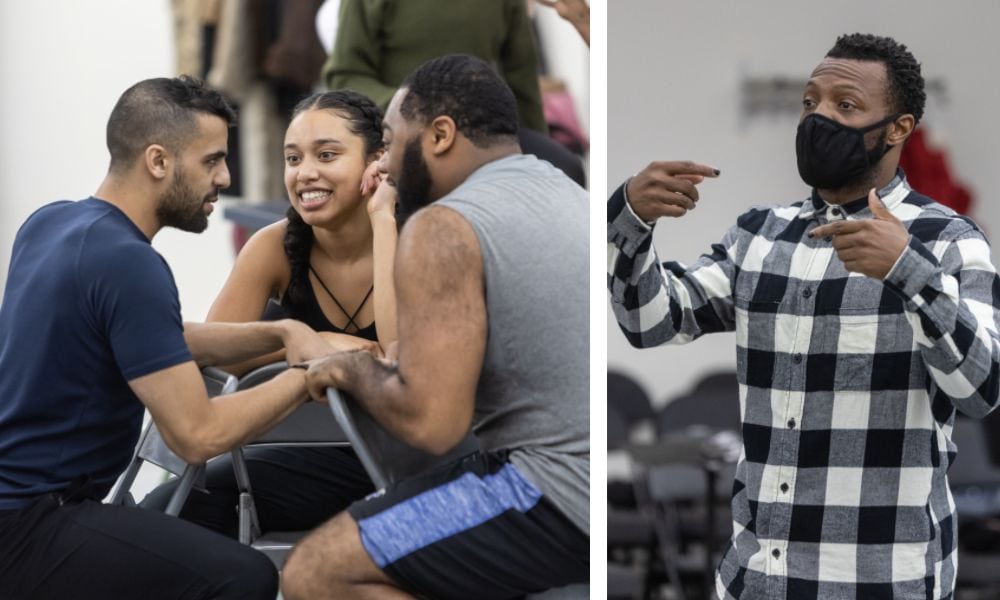
You’re also a choreographer. What is it about dance and musical theater that you so care about and have devoted so much of your career to?
In a musical, you sing because the emotions are too much and go beyond what can be expressed through words, and we dance because it even goes beyond singing. Dance to me is the ultimate way of expressing oneself in musical theater. I’m in theater because I love storytelling, but I love storytelling that defies expectation, that is outside the natural or realism. And nothing is less naturalistic and realistic than musical theater, right?
You’ve said: “My hope is that Signature is really a leader in the field for the future of musical theater. I hope we can push the envelope and represent voices that have been underrepresented on our stages in the past.”
You’ve also said: “Signature’s reason for existence has to do with the advancement of musical theater. I want to see how we can take that genre forward.”
Arguably, American musical theater as a genre and industry has had the effect — intentional or unintentional — of maintaining privilege and the status quo. Do you see a future where musical theater can intentionally be a medium for social change, for instance toward equity and community building?
You know, yes, musical theater as a genre has been a white man’s game for a very long time. If you look at the musicals that have been on the Broadway stage, upwards of 80 percent have been written by white men.
But musical theater at its essence comes from a place of voices that weren’t heard. Think of George M. Cohan, whose grandparents were Irish immigrants and who wrote “Yankee Doodle Dandy”: He was making a political statement, saying, I am here too, I’m American. And think about Irving Berlin and the history of Jewish writers in the American musical theater. And think of the influence of Black composers on everything. These voices are embedded in the musical theater world but haven’t necessarily been allowed to be represented in the most authentic way. We all love stories like West Side Story, Fiddler on the Roof, and Sound of Music, which are inherently stories about the outsider or the point of view that is outside of the status quo. I want to see that continue. But how can we make that continue in a way that is more authentic? How do we make sure that the voices that are telling those stories are the most authentic and representative, and truly diverse, to break apart the status quo?
We think of musical theater as broad commercial appeal, but what those original composers were attempting to do — what Arthur Laurents and Stephen Sondheim and Leonard Bernstein were attempting to do with West Side Story, even before that what Rodgers and Hammerstein were attempting to do with their entire canon of musicals — was to expose the cracks in the status quo. Whether or not they were successful and whether or not they’re still valid today is a completely different discussion, but that’s what they were attempting to do. Kander and Ebb, Cabaret. All of these are musicals that very much expose America for what it is.
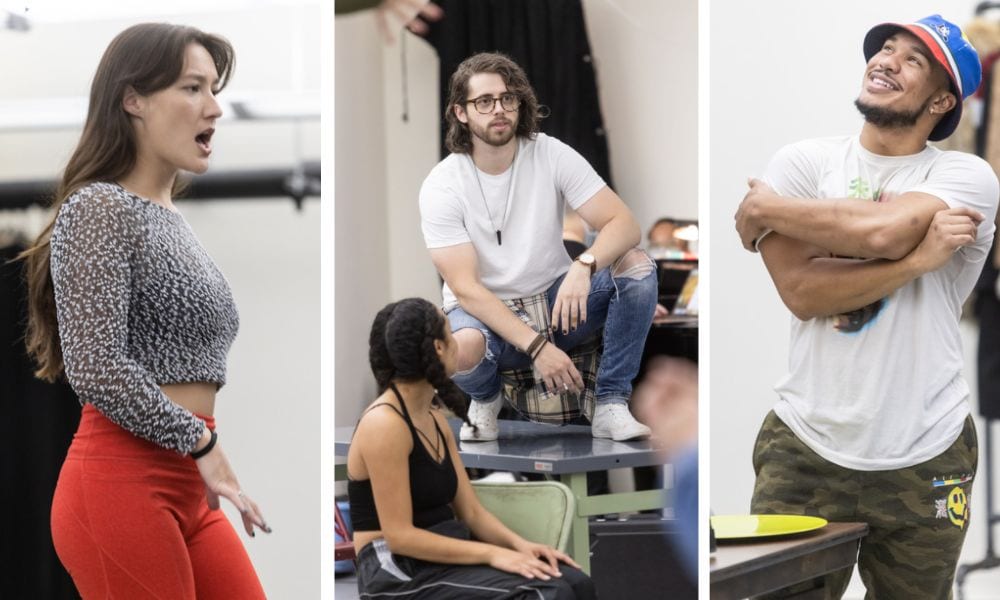
Who is your team inside Signature for focusing on and furthering the future of musical theater, and what outside resources do you look to for guidance, inspiration, or advice?
Right now, I’m looking to build the team. I’m looking to pull in a new associate artistic director and a director of artistic development to help me put that plan into action. Currently, I am sort of flying solo at Signature. It is going to be important that the team surrounding me has the same goals that I do but also brings to the table viewpoints that aren’t the same as mine, that have different perspectives on the kinds of stories that should be on our stage and the kind of composers and writers that we should be pursuing to put on our stage. Externally, I am constantly looking at broadening the artists that I am in communion with, the creative producers and the creative minds and the dramaturgs. I’m constantly looking to expand my tent and the people I am looking to for advice and influence and new and differing perspectives. That’s always going to be really important to me, that I’m inviting people into my world that have a varied perspective.
Signature has been working with the Wayfinding Partners consultancy around anti-racism and racial equity. How will that work relate to future musical theater programming and production? Are you thinking differently about season planning and hiring?
Wayfinding Partners is specifically geared toward helping us view everything through an anti-racist, anti-oppressive lens. Over the last year, they have worked with our staff and Signature’s board helping us to see what our biases are, what are the things that are standing in our way from being a truly anti-racist organization. That is the way in which they have been helpful, and they will continue to be helpful to us. They won’t be selecting our programming or changing what we are doing in terms of our artistic products, but they are definitely changing the lenses through which I am viewing not just Signature but the world. It’s going to be up to me and to our artistic team and Signature as a whole — after this past year and a half of conversations looking at our racial equity plan and making various commitments — to see to it that what we are putting on our stage is diverse and representative of our community.
I’d like to ask two questions about the responsibility you now bear in your role as Signature’s artistic director — as an arts leader whose choices, decisions, and public-facing communications are now being looked to by the community of theatergoers and theater-makers.
You succeeded Eric Schaeffer, whom you met in summer 2002 and whom you have described as “without a doubt the person I consider my mentor.” I’ve also had a very important mentor in my life, someone who changed me, someone whose influence stays in me though we ended differing, so I’ve thought deeply and personally about my next question, which is about the experience of being mentored:
What lessons did you learn from Eric about what to do and how to be, and what lessons did you learn from him about what not to do and how not to be?
Eric has been a part of my life since I was a sophomore in college. So certainly my experience with him — as an assistant, the ways in which he built this theater that I have been privy to for over 18 years — has in many ways influenced me. It’s a hard question to answer because I’m not sure that I am fully cognizant in this moment of the ways that he has shaped me as an artist and a leader, but I am constantly aware in moments of the ways in which I am like him, and also the ways in which I am very different from him. What made Eric wonderful was that he was a great captain of a ship, and he was able to get so many people to rally behind his vision. I would hope I am also capable of exciting people and getting people all on board and driving toward the same goal. I think I’ll leave it on that positive thought.
The circumstances of Eric’s resignation had to have affected you personally, but my question is about the meaning of those circumstances in the larger context of audiences and arts workers. For some of those people, the circumstances of Eric’s resignation were painfully polarizing. For a while on social media, it was as if there was team defender and team denouncer. I was following it. I saw friendships frayed, I saw trust broken, it hurt all over. Now that you have succeeded Eric as artistic director, it seems to me you are in a truly tough spot because what you do and say will necessarily serve either reconciliation and healing or revisionism by silence. What are your thoughts about that? What do you feel needs saying? What needs to be done?
The goal always is for Signature to be a place that is safe. I have had many, many conversations with many individuals in the past year and a half to both assess the ways in which Signature may have failed in the past as well as the ways that Signature can provide assurances in the future. It is of utmost importance to me going forward that Signature be a place that is free of harassment, free of discrimination. There have been many personal conversations, private conversations. That is what is important in this moment, that Signature is able to offer a space of safety and of joy.
In the new artistic director role that you have, do you see yourself communicating this outside the Signature workplace, to audiences and the arts-worker community?
I think that we have made every effort to make it clear that we take the accusations of people seriously. There are many conversations that have taken place internally at Signature about the ways in which our policies need to be looked at and our practices need to be looked at. And there are new people in new positions. A resident intimacy consultant is looking with me at all of our policies and making sure that there is a culture of consent at Signature at all times. What is important in this moment for Signature is how we are creating that culture going forward.
One last question: what most excites you about Signature’s next season?
I’m excited about welcoming our audiences back into our space. I am excited for them to see the faces that they have known and loved for many years, the artists that they have come to respect, back on our stage. I’m also excited to introduce them to new audiences and to new artists and to new writers, to new voices. That’s what I’m very excited about in this moment.
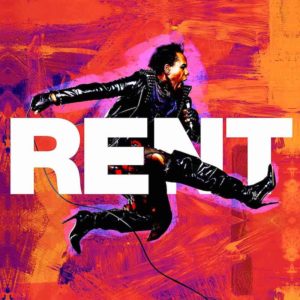
Rent plays November 2, 2021, through January 2, 2022, in the MAX at Signature Theatre – 4200 Campbell Avenue in Arlington, VA. For tickets ($40–$108), call (703) 820-9771 or go online. Information about ticket discounts is available here.
Closed captions for RENT will be available for every show via the GalaPro app.
Signature’s COVID safety plans can be found here.




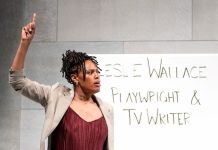
Great interview, John…Thanks for doing it,
Barbara